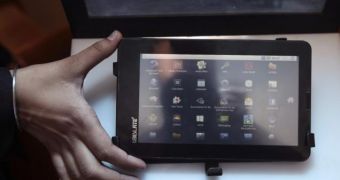The original Aakash tablet, while cheap, was not left without its share of berating, but Datawind was already working on a new and improved version when the Indian Cellular Association said its piece.
The Aakash tablet, with its price of $35 / 27 Euro, practically set the foundations for cheap tablets, even if it was a very specialized item limited to India.
Indian Cellular Association didn't feel it was up to scratch though, and had no qualms about saying so.
Nevertheless, that reaction did not, ultimately, have much bearing on the eventual decision to build the Aakash 2.
After all, Datawind, the company behind the slates, was already developing it when the lambasting occurred.
That said, the Aakash 2 tablet appears to have finally been revealed in India.
Equipped with a 700 MHz ARM Cortex-A8 central processing unit, it is about twice as fast as its predecessor.
Granted, this, along with all the other, minor, changes, caused the price to go from $35 / 27 Euro to $40 / 30.59 Euro, but that sum is still tiny compared to what regular media slates ship for.
The one aspect that did not see any improvement was battery life: the 3,200mAh lithium-ion pack, while decent, cannot last for more than three hours on a single charge.
Still, given that the Aakash 2, like the first one, is mostly aimed at students that won't stay too long away from power outlets, this is an easy enough problem to dodge.
“These higher specifications, which include 700 MHz Cortex A8 processor, 3200mAH battery with three-hour usage time and a capacitative touch screen, have been necessitated to overcome the initial difficulties observed in the devices,” said Human Resource Development Minister Kapil Sibal.
Datawind's Aakash 2 runs the Android 2.3 operating system and will be deployed as soon as the education initiative receives the necessary funds.

 14 DAY TRIAL //
14 DAY TRIAL //